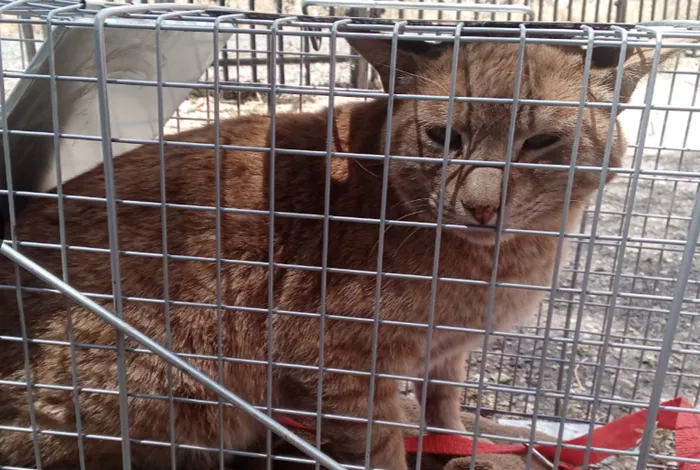The Devon Rex cat, known for its striking appearance and playful personality, is a popular breed among cat enthusiasts. These cats are characterized by their large ears, wavy fur, and affectionate nature. A common question among Devon Rex owners is whether it is safe and beneficial for these cats to go outside. This article explores the pros and cons of allowing a Devon Rex to venture outdoors, provides training tips for a safe outdoor experience, and offers guidance on creating a balanced indoor-outdoor lifestyle for your feline friend.
Understanding the Devon Rex Breed
The Devon Rex is a unique and captivating breed with several distinctive features:
Physical Characteristics: They have a slender, muscular build with large ears, wide-set eyes, and a short, wavy coat.
Personality Traits: Devon Rex cats are known for their affectionate, playful, and social nature. They enjoy human companionship and often exhibit dog-like behaviors, such as fetching toys and following their owners around.
Health Considerations: While generally healthy, the breed can be prone to certain genetic conditions, including hypertrophic cardiomyopathy (HCM) and patellar luxation.
Pros and Cons of Letting Your Devon Rex Go Outside
Before deciding whether to let your Devon Rex outside, it’s important to weigh the potential benefits and risks:
Pros of Outdoor Access
Physical Exercise: Outdoor access provides ample opportunities for exercise, helping to maintain a healthy weight and prevent obesity.
Mental Stimulation: The sights, sounds, and smells of the outdoors offer mental enrichment, reducing boredom and associated behavioral issues.
Natural Behaviors: Being outside allows cats to engage in natural behaviors such as climbing, hunting, and exploring, which can enhance their overall well-being.
Sunlight and Fresh Air: Exposure to natural sunlight and fresh air can be beneficial for a cat’s physical health and mood.
Cons of Outdoor Access
Safety Risks: Outdoor environments pose various dangers, including traffic, predators, toxic plants, and potential encounters with other animals.
Health Risks: Outdoor cats are more susceptible to diseases, parasites, and injuries. Regular veterinary check-ups and preventive care are essential for outdoor cats.
Environmental Impact: Cats are natural hunters and can negatively impact local wildlife populations, particularly birds and small mammals.
Unpredictable Weather: Weather conditions can be harsh and unpredictable, posing additional risks to cats that are not accustomed to the outdoors.
Preparing Your Devon Rex for Outdoor Adventures
If you decide to allow your Devon Rex to go outside, proper preparation and training are crucial to ensure their safety and well-being:
Health and Safety Precautions
Vaccinations and Parasite Control: Ensure your cat is up-to-date on vaccinations and receives regular flea, tick, and worm treatments.
Identification: Equip your cat with a collar and ID tag with your contact information. Microchipping provides an additional layer of security.
Safe Environment: Ensure that the outdoor area is safe and secure. Consider creating an enclosed space, such as a catio or a fenced yard, to minimize risks.
Supervision: Initially, supervise your cat closely during outdoor excursions to monitor their behavior and ensure they do not encounter any hazards.
See Also: When Do Calico Cats Get Fluffy?
Training Your Devon Rex for Outdoor Exploration
Training a Devon Rex to safely enjoy the outdoors involves patience and gradual exposure:
Leash Training: Start by introducing your cat to a harness indoors. Allow them to become comfortable wearing it before attaching a leash. Begin with short, supervised outdoor walks in a quiet area.
Positive Reinforcement: Use treats, praise, and gentle encouragement to reward your cat for positive behaviors during training sessions.
Gradual Exposure: Gradually increase the duration and complexity of outdoor experiences. Allow your cat to explore at their own pace, ensuring they feel safe and secure.
Familiarization with Commands: Teach basic commands such as “come” and “stay” to improve your ability to manage your cat’s behavior outdoors.
Creating a Balanced Indoor-Outdoor Lifestyle
Finding the right balance between indoor and outdoor time is key to ensuring your Devon Rex remains healthy, happy, and safe:
Indoor Enrichment
Interactive Toys: Provide a variety of interactive toys to keep your cat engaged and stimulated indoors.
Climbing Structures: Install cat trees, shelves, and perches to satisfy your cat’s climbing instincts.
Window Perches: Set up window perches to allow your cat to observe the outside world from the safety of indoors.
Puzzle Feeders: Use puzzle feeders to challenge your cat’s mind and provide mental stimulation during meal times.
Supervised Outdoor Time
Enclosed Spaces: Create a secure outdoor enclosure or catio where your cat can safely enjoy the outdoors without the risks associated with free-roaming.
Leashed Walks: Regularly take your cat on leashed walks to provide exercise and mental stimulation while ensuring their safety.
Garden Exploration: If you have a secure garden, allow supervised exploration, ensuring there are no toxic plants or hazards.
Seasonal Considerations
Weather Adaptations: Adjust outdoor activities based on weather conditions. Provide shade and water during hot weather, and limit outdoor time during extreme cold or inclement weather.
Seasonal Parasite Control: Be extra vigilant about parasite prevention during peak seasons for fleas, ticks, and mosquitoes.
Case Studies and Real-Life Experiences
Several case studies highlight the successful integration of outdoor access into a Devon Rex’s lifestyle:
Case Study 1: Harness Training Success: A Devon Rex owner successfully trained their cat to walk on a harness and leash, allowing them to explore the neighborhood safely. The cat’s confidence and curiosity increased, and their overall behavior improved due to the added stimulation.
Case Study 2: Catio Installation: Another owner installed a spacious catio connected to their home, providing their Devon Rex with a safe outdoor space. The cat enjoyed sunbathing, climbing, and watching birds, leading to reduced indoor stress behaviors.
Case Study 3: Garden Adventures: A secure, enclosed garden allowed a Devon Rex to explore and play outside under supervision. The cat’s physical health improved due to increased exercise, and they became more relaxed and content.
Expert Opinions and Recommendations
Veterinarians and feline behaviorists offer valuable insights into the pros and cons of allowing cats, particularly Devon Rexes, to go outside:
Veterinary Perspective: Dr. Jane Smith, a feline veterinarian, emphasizes the importance of balancing outdoor access with safety precautions. “While outdoor exploration can be enriching, it’s crucial to ensure the environment is safe and to stay vigilant about health and parasite prevention.”
Behaviorist Insight: Feline behaviorist Dr. John Doe suggests gradual training and positive reinforcement as key strategies for introducing cats to the outdoors. “Patience and consistency are essential. Start slowly, and always make sure your cat feels secure.”
Conclusion
Deciding whether to let your Devon Rex cat go outside is a personal choice that requires careful consideration of the potential benefits and risks. By taking appropriate health and safety precautions, providing gradual training, and balancing indoor and outdoor enrichment, you can create a safe and stimulating environment for your Devon Rex. Whether through harness walks, enclosed gardens, or catios, outdoor exploration can enhance your cat’s physical and mental well-being, contributing to a happy and healthy life.
FAQs:
Q: What if my Devon Rex refuses to wear a harness?
A: Introduce the harness gradually, using treats and positive reinforcement. If the cat remains resistant, consider other forms of secure outdoor access, such as a catio.
Q: How can I protect my Devon Rex from parasites and diseases?
A: Ensure your cat is up-to-date on vaccinations and receives regular flea, tick, and worm treatments. Consult your veterinarian for a tailored preventive care plan.
Q: Is it possible for a Devon Rex to adapt to outdoor life if they’ve always been indoors?
A: Yes, with gradual training and positive reinforcement, an indoor Devon Rex can adapt to supervised outdoor time. Start slowly and monitor their reactions closely.
























